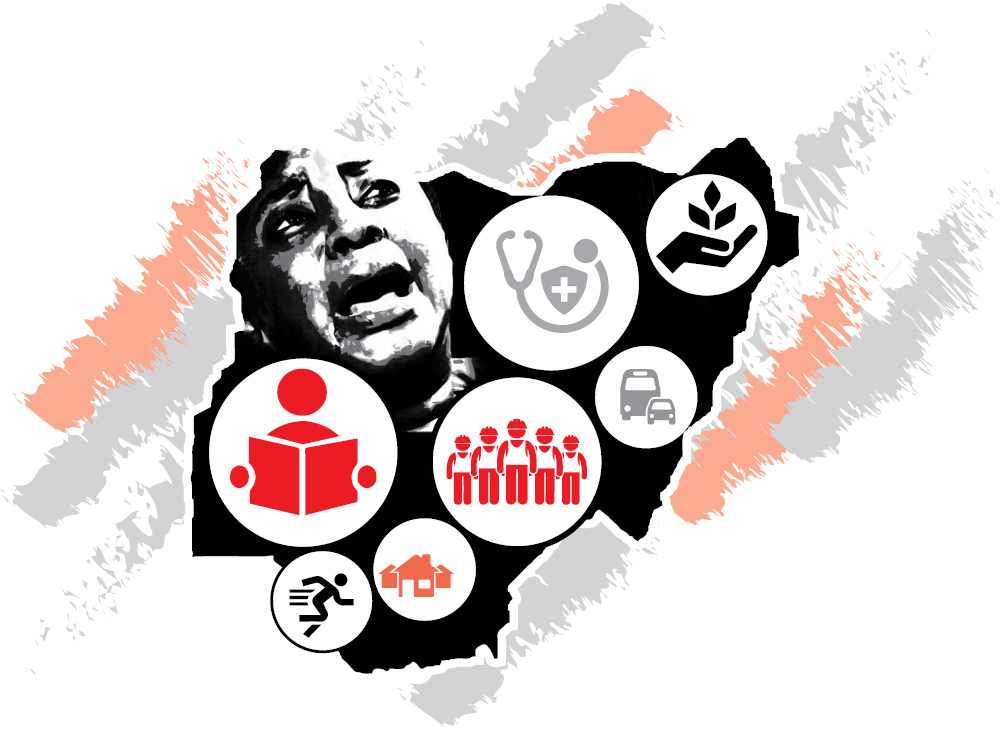Hmm, the way Nigeria is going
Rvery day we keep hoping and praying that things would get better in Nigeria. But nearly all the socio-political problems we lament over have failed to change for the better. Except for insurgency, which has largely been tackled, very little in terms of our socio-political challenges have been dealt with in such a manner that […]

Rvery day we keep hoping and praying that things would get better in Nigeria. But nearly all the socio-political problems we lament over have failed to change for the better. Except for insurgency, which has largely been tackled, very little in terms of our socio-political challenges have been dealt with in such a manner that would give the ordinary Nigerian much hope in the country’s future. Perhaps, our situation could be a consequence of the divine assertion mentioned in the Holy Book of Islam. Allah (SWT) states in Qur’an 13:11 “…Verily never will Allah change the condition of a people until they change it themselves (with their own souls)…”
How could things get better when aberrations, instead of ideals, have become the order of the day? Many of the things that are supposed to be exceptional circumstances in our day-to-day activities have rather become the norm. Whether in matters of religion, politics, education or economy, the story is the same in all aspects of our daily life. The old glory of decency, honesty, firmness, accountability, modesty and fair dealing that hitherto characterized the life of Nigerians have virtually been substituted with self-centeredness, corruption, irresponsibility, betrayal and injustice.
Law-breaking is about the most obvious aberration in modern Nigeria. In the early post-colonial period, it was natural to comply with guidelines and deadlines provided, for example, for the sale or submission of application forms. In the past, when the sale or submission has closed, it has actually closed and no ‘Oga at the top’ would issue any note that contravenes sale or submission deadlines. Today, the sale or submission of all kinds of application forms continues even when the deadline is past. Except you don’t have the money to bribe those in charge of the sale or collection of the forms or you are not ‘connected’, most deadlines have become empty instructions obeyed by decent individuals, the poor and the ‘not-connected’. The practice of ignoring deadlines over the years has almost become a norm in Nigeria, such that anyone who attempts to halt any illegal sale or submission of such forms is virtually seen by others as ‘a cog in the wheel of the system’. Deadlines now mark the beginning of any advertised activity. This trend is surviving because of the deep-rooted corruption in the country.
Nowadays, when you hear that registration for a particular activity has closed, that is indeed the actual time it would start. In the days of regional governments in Nigeria, when admission or registration is said to have closed, it has actually closed. In the good old days, too, when you hear employment or land allocation has stopped or has been suspended, it has actually stopped or has truly been suspended. Laws, guidelines and deadlines were made in the past for all citizens and their implementation was without prejudice to the position, status or rank of any individual. Today, it is not so. The worst hit in all these aberrations is the ordinary Nigerian.
The growing politicization and associated corrupt tendencies of all aspects of the civil service are other irregularities to worry about. Career progression and promotions, especially at higher cadres, also give us some apprehensions because of the corrupt tendencies that have dislodged due process. Indeed, due process is a matter for ordinary individuals that are ‘not connected’. Civil servants collect notes from influential political office holders to influence their promotions even when they do not deserve or qualify to be promoted. This happens in nearly every sector. We just hope the practice would not extend to the military and other security agencies.
Dedication to assigned duties does not matter so much again in the public service. What matters is the extent to which a public officer remains loyal to his boss. Loyalty in today’s public service is determined by the measure of an officer’s commitment to do the bidding of his boss, whether right or wrong, and whether it conforms to civil service rules or financial regulations. This explains why some Chief Executives Officers (CEOs) run their departments, agencies or units according to their whims and caprices. Such discriminatory CEOs use sentiments, not merit or commitment, to decide who does what. They give ‘juicy’ schedules that are statutorily the responsibilities of senior officers to others that are junior in rank; precluding senior officers from carrying out the mandate of their respective offices. The tendency to engage in corrupt practices sometimes define membership of a departmental or unit management committee.
More worrisome is the latest practice where highly place politicians and political office holders interfere with what is ordinarily an internal matter, such as internal posting of staff. Some people could go to the highest authorities in government at the federal, state or local government level. It would not be news if a staff in any of the MDAs goes to collect a note from The Presidency to influence his posting to a ‘juicy’ department or unit. These inconsistencies do not allow for diligent officers to either grow or serve in the right positions. The perpetration of these illegalities through the abuse of office and due process further makes ordinary Nigerians more vulnerable.
Hmm, if Nigeria continues in this way, I fear for the future that awaits the present generation of Nigerians. Excellence is being sacrificed on the altar of nepotism, favouritism, and financial inducement. No country can develop without transparency, accountability and discipline. The Buhari regime’s anti-corruption mantra would be in vain if the erosion of due process in the system is not halted now. May Allah (SWT) redeem Nigeria form all its present socio-political and economic challenges, amin.
